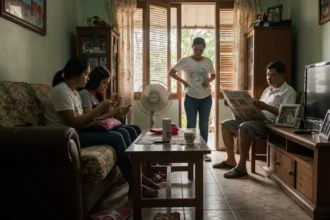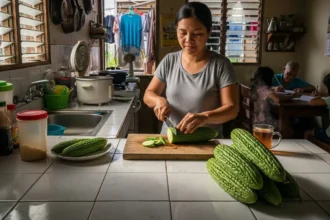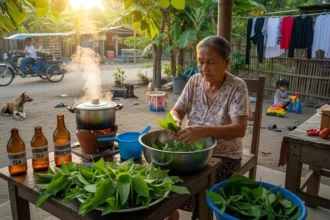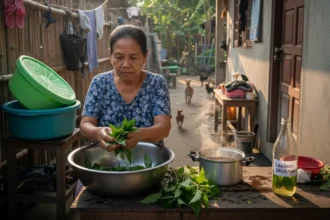😓 Pagod Ka Na Ba, Nanay?
It’s 5 a.m. – before the sun rises, you’re already awake. You cook breakfast, prepare baon, wake up the kids, remind your husband about his things, maybe squeeze in laundry before heading to work or logging in online. By lunch, you’ve already juggled a dozen tasks. Come evening, you’re still the last to sleep, folding clothes or checking assignments.
This is the everyday life of countless Filipino moms. And while society praises you as “Super Nanay” – tireless, selfless, smiling through it all – deep down, you may feel exhausted, drained, or guilty for even wanting a break.
Here’s the truth: you don’t need to be perfect, and you don’t always have to be okay. What you’re feeling has a name – burnout – and it’s real. This guide is here to help you understand it, recognize the signs, and take small but powerful steps toward healing.

🔋 What is Burnout?
Burnout isn’t just being pagod. It’s that deep, bone-level exhaustion that clings to you no matter how much you sleep or rest. It’s more than physical tiredness – it’s mental, emotional, and even spiritual drain.
Think of it like this:
-
A phone battery stuck at 1%, no matter how long it’s been charging.
-
A cup everyone drinks from, but nobody bothers to refill.
-
A jeepney that keeps running without ever stopping at the gas station.
That’s burnout.
For many Filipino moms, it shows up as:
-
Waking up already exhausted.
-
Snapping at kids or partners over small things.
-
Feeling guilty for wanting time alone.
-
Losing the joy in things that used to make you happy.
And here’s the truth: it’s not weakness. It doesn’t mean you’re a bad mom, or that you can’t handle life. Burnout is the natural result of giving too much of yourself without pausing to recharge.
I once heard a nanay friend describe it perfectly: “Parang ako yung wifi – lahat konektado sa akin, pero ako mismo, disconnected na.” That’s burnout in a nutshell.

Unique Cultural Pressures on Nanays
Filipino moms carry the same challenges mothers face around the world – but layered on top are cultural expectations that make burnout feel almost built into the role. Here are some of the heaviest pressures:
👩👧👦 “Inang Bayani” & the Martyrdom Complex
We glorify the image of the selfless, sacrificing mother – the inang bayani who gives everything and asks for nothing. Society claps for the mom who endures exhaustion, illness, even depression, as long as her family thrives. But here’s the truth: living as a “martyr” isn’t sustainable. You can’t pour from an empty cup, and yet Filipino moms are told that sacrificing themselves is the highest form of love.
🏡 “Ano na lang ang sasabihin ng iba?”
In the Philippines, appearances matter. Many moms feel pressure to maintain the image of the perfect home, perfect kids, and perfect self – not just for their own pride, but to avoid judgment from kapitbahay, relatives, or even Facebook. The weight of “Ano na lang ang sasabihin ng iba?” can be heavier than the chores themselves.
🤝 Family Expectations & Utang na Loob
Motherhood here doesn’t stop at raising your own kids. Many moms also care for aging parents, siblings, or pamangkins, driven by duty and utang na loob (debt of gratitude). Your role never ends at just “mom” – you become caregiver, provider, and family backbone all at once.
👩💼 The Double Burden of Working Moms
Even if a Filipina mom excels at her career, she’s often still expected to be a full-time homemaker. Work doesn’t excuse you from cooking dinner, helping with homework, or running the household. The result? A double shift that stretches from the office to the kitchen – and no clock-out time.
🌍 OFW Moms & Wives
For OFW moms, the guilt of being away from their children can be overwhelming, even as they sacrifice to provide a better future. For wives of OFWs, the challenge flips – loneliness, single-handed parenting, and the constant pressure to hold the family together while a partner is miles away.

🚩 Red Flags: Symptoms of Burnout, Filipino Style
Burnout creeps in quietly. At first, it feels like just another pagod day, but over time it becomes something deeper. Here are the warning signs many Filipino moms experience – some you might even shrug off as “normal,” but they’re really signals your body and mind are waving at you.
🧠 Emotional & Mental Signs
-
“Nauubos na ang pasensya.” You find yourself snapping at your kids, partner, or even yourself over little things.
-
Feeling manhid. Days blur into autopilot: wake up, cook, clean, work, sleep – repeat. Joy feels distant.
-
Overwhelming guilt. Even when you’ve done so much, you feel like it’s never enough. That quiet voice whispers: “Hindi ka pa rin sapat.”
-
Anxiety. Small, everyday tasks like planning meals or helping with school projects suddenly feel like climbing a mountain.
-
Loss of joy. Activities that once made you happy – hobbies, bonding with kids, even watching your favorite teleserye – no longer spark excitement.
🩺 Physical Signs
-
Constant fatigue. You wake up tired even after 8 hours of sleep, as if rest isn’t working anymore.
-
Body aches. Headaches, stiff shoulders, back pain (pananakit ng likod), or even pasma become regular companions.
-
Appetite & sleep changes. Either you overeat for comfort, or lose your appetite entirely. Some moms oversleep to escape, while others lie awake with insomnia.
-
Weakened immune system. You catch colds, coughs, or fevers more easily, because stress wears down your body’s defenses.
| Normal Tiredness | Mom Burnout |
|---|---|
| Energy returns after resting | Fatigue persists even after ample sleep |
| Patience runs low sometimes | “Nauubos na ang pasensya” – irritation is constant |
| Hobbies still bring joy | Loss of interest in favorite activities |
| Occasional overwhelm | Overwhelm is constant; feeling numb or disconnected |
🌱 Pahinga Muna, Nay: Toolkit for Healing
Burnout doesn’t go away overnight, but small shifts in mindset and daily habits can slowly refill your cup. Healing starts when you give yourself permission to pause – because even nanays need rest.
💭 Mindset Shifts
-
Self-care is not selfish. A recharged mom = a better mom. You can’t pour from an empty cup. Five minutes of quiet coffee time or a short walk isn’t luxury – it’s maintenance.
-
“Good enough” is enough. The house doesn’t need to look Instagram-ready. It’s okay if dinner is takeout or if toys are scattered for a while. Your worth isn’t measured by spotless floors.
-
Rest is productive. Filipino moms often see rest as sayang oras. But truth is, rest makes you sharper, kinder, and stronger for your family.
🧑🤝🧑 Asking for and Accepting Help
-
Break the “Kaya ko ’to” mindset. Carrying everything alone is not a badge of honor – it’s a shortcut to burnout.
-
Talk to your partner. Don’t wait until you explode. Try small asks like:
“Pwede bang ikaw muna sa homework habang ako magluluto?”
-
Involve the kids. Even toddlers can tidy toys, and teens can cook rice, sweep floors, or wash dishes. Helping out teaches responsibility – and gives you breathing room.
-
Lean on your village. Filipino culture thrives on community. Don’t hesitate to ask lola, titas, or kumares for backup, whether it’s babysitting, cooking, or just lending an ear.
📊 Table: Age-Appropriate Chores for Kids
| Age | Simple Chores |
|---|---|
| 3–5 years old | Pick up toys, wipe spills |
| 6–9 years old | Set the table, water plants |
| 10–12 years old | Wash dishes, fold laundry |
| Teens | Cook rice, sweep/mop, babysit |

🌸 Finding “Pockets of Peace”
You don’t always need a grand vacation or spa day to heal from burnout. Sometimes, the best medicine is in the small, everyday moments – little pauses that let you breathe and remember you’re more than just a to-do list.
⏳ Micro-Breaks
Even 5–10 minutes can reset your energy.
-
Sip coffee slowly instead of gulping it while washing dishes.
-
Step outside to feel the morning sun or listen to the rain.
-
Close your eyes, breathe deeply, and remind yourself: “Okay lang magpahinga.”
🌼 Small Joys
Tiny hobbies bring back color to tired days.
-
Tend to a plant on your windowsill.
-
Read one chapter of a book (kahit ilang pages lang).
-
Watch an episode of your favorite K-drama or teleserye without guilt – yes, you deserve it.
👭 Kumare Talks
Never underestimate the therapy of kwentuhan and laughter with friends.
-
Call a kumare, vent about your day, and share chismis or memes.
-
Meet for merienda – turon + tsismis can do wonders for the soul.
-
Even group chats can feel like a lifeline when you need to be reminded: “Hindi ka nag-iisa, Nay.”

🩺 When to Seek Professional Help
Burnout can usually be managed with rest, support, and small lifestyle shifts. But sometimes, it goes deeper – crossing into anxiety, depression, or serious health issues. That’s when it’s no longer just about “pahinga muna,” but about getting professional care.
🚩 Red Flags That It’s Time to Seek Help
-
Symptoms persist for weeks. You’ve tried resting, asking for help, or making small changes, but the exhaustion, sadness, or irritability won’t go away.
-
You can’t function daily. Ordinary tasks like cooking, working, or even getting out of bed feel impossible.
-
Hopelessness sets in. You feel empty, numb, or like nothing will ever improve.
-
Thoughts of giving up. If you ever feel like life isn’t worth it, or you’re better off gone – this is an emergency. Please seek immediate support.
💡 What Seeking Help Looks Like
-
Primary care doctor. Start with your family doctor who can check if physical health (like thyroid, anemia, or hormones) is contributing.
-
Therapists or counselors. Talking to a mental health professional gives you tools to process stress and emotions.
-
Psychiatrists. If needed, they can prescribe medication for depression, anxiety, or sleep disorders.
🤝 Removing the Stigma
In the Philippines, many still think therapy is “only for the crazy.” That’s not true. Therapy and medical care are just like going to the doctor when you have diabetes or high blood pressure. Taking care of your mental health doesn’t make you weak – it makes you wise.
I remember a close tita who finally saw a counselor after years of pushing through alone. She told me, “Akala ko kahihiyan ‘yun. Pero nung nakausap ko siya, parang nabunutan ako ng tinik.” Sometimes, professional help is the bravest step you can take.
📞 Emergency Hotlines in the Philippines
-
DOH-NCMH Crisis Hotline: 1553 (landline); 0966-351-4518 / 0917-899-8727 (mobile)
-
Hopeline PH: (02) 8804-4673 or 0917-558-4673
-
Local hospitals and barangay health centers can also refer you to available counselors.
📊 Table: Mental Health Resources in the Philippines
| Resource | Contact |
|---|---|
| NCMH Crisis Hotline | 1553 / 0917-899-USAP |
| InTouch Community Services | (02) 8893-7603 |
| UP Diliman Psych Services | University-based, low-cost |
| Ateneo Bulatao Center | Counseling services |
| Online Counseling Platforms | As low as ₱500/session |
📚 Frequently Asked Questions
Is burnout the same as depression?
Not exactly. Burnout is from stress; depression is a medical condition. But burnout can lead to depression if ignored.
I feel guilty resting. Is that normal?
Yes, many moms feel this. But remember – rest is part of love.
What if my husband doesn’t help?
Start with small tasks and gentle communication. If needed, involve extended family.
Can stay-at-home moms get burnout too?
Absolutely. Managing kids and the home is a full-time job.
How do I know if I need professional help?
If burnout affects daily life or your safety, talk to a doctor or counselor.
Are there affordable counseling options?
Yes, barangay centers, universities, and online platforms offer low-cost services.
How do I balance self-care with family care?
Start with micro-breaks and involve the family in chores.
What’s one small step I can take today?
Rest for 10 minutes. That’s already a start.

❤️ A Loving Reminder for Nanay
Nanay, you are the heart of your home. Every meal cooked, every hug given, every sacrifice made – they all carry your love. But even the strongest hearts need rest.
Burnout doesn’t mean you’re weak. It doesn’t mean you’ve failed. It simply means you’ve been giving so much, without pause, that your own cup has run dry. And you cannot keep pouring love if you don’t allow yourself to refill.
Remember this: self-care is not luho. It’s not selfish. It’s survival. It’s love in action – for yourself and for your family, who deserve a mom that feels whole and alive, not empty and exhausted.
So today, take one small step:
-
Breathe deeply, even just for a few minutes.
-
Delegate one chore – yes, let someone else wash the dishes.
-
Call a kumare and laugh about something silly.
-
Enjoy your merienda without guilt – kahit turon lang ‘yan or a quiet cup of kape.
Because, Nanay, hindi ka nag-iisa. So many mothers feel what you’re feeling, and there is strength in admitting it. You are enough. More than enough. And you don’t have to be perfect to be the best mom your family could ever ask for.
And if you ever forget that, let this be your reminder: your worth isn’t measured by spotless floors, perfect grades, or endless giving. Your worth simply is.










